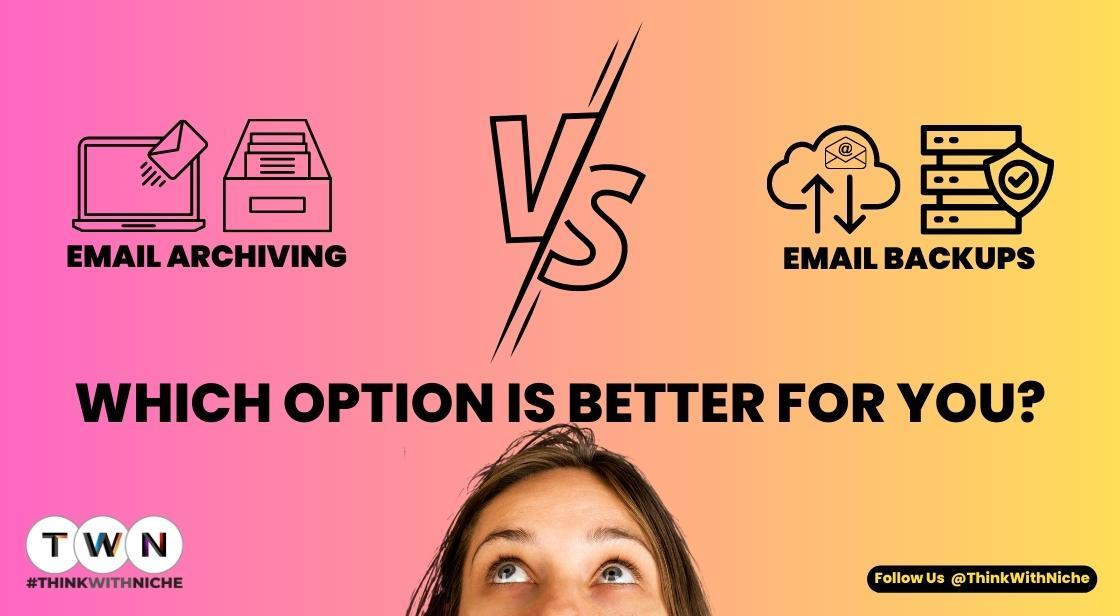Email Archiving Versus Backups - Which Option Is Better For You?

Blog Post
"Email Archiving vs Backups - Which is the Best Option for You? Learn the key differences and advantages of each solution to make an informed decision on how to best preserve your important data. From regulatory compliance to data recovery, we'll explore the pros and cons of email archiving and backups to help you choose the best option for your unique needs."
When it comes to preserving your important data, such as emails, you have two primary options: email archiving or backups. While both options are designed to keep your data safe, they function in very different ways.
Email archiving involves automatically capturing and storing all emails and other data in a central, searchable location. This type of solution is commonly used for regulatory compliance purposes, as it allows companies to easily search and retrieve emails when needed. Email archiving can also help prevent data loss in the event of a system failure or cyber attack.
Backups, on the other hand, involve making copies of your data and storing them in a separate location. This type of solution is commonly used for disaster recovery purposes, as it allows you to restore your data in the event of a catastrophic event such as a fire or flood. Backups can also help recover accidentally deleted emails or data.
When deciding between email archiving versus backups, it's important to consider your specific needs. If you're required to comply with regulations such as HIPAA or GDPR, email archiving may be the best choice for you. If you're concerned about data loss due to system failures or cyber attacks, backups may be the better option.
Ultimately, both email archiving and backups serve different purposes and can complement each other in a comprehensive data preservation strategy. By understanding the key differences between the two solutions, you can make an informed decision on what will work best for you.
When it comes to preserving your emails and other data, you may be considering two options: email archiving or backups. Both have their own advantages and disadvantages, and depending on your needs, one solution may be better than the other.
We'll discuss the key differences between email archiving versus backups so that you can make an informed decision on what will work best for you.
Email Archiving Versus Backups - Which Option Is Better For You?
What Is Email Archiving?
Email archiving refers to the process of saving emails for long-term retention. Email archiving systems store email in an organized fashion and allow users to access them years later if necessary.
This type of system is beneficial for businesses that need to keep records intact and protect confidential information. Emails are kept in a secure location, so they can't be lost, stolen, or altered.
Email archiving solutions provide users with advanced search and retrieval capabilities so that they can quickly locate specific emails when needed.
When it comes to implementing an email archiving or backup solution, it's important to consider seeking professional help to ensure that the system is set up correctly and effectively.
A professional consultant can offer guidance on selecting the right solution for your organization's needs and can assist with the implementation process to ensure that it is seamless and that all email data is being properly stored and retained.
In addition, professional help can be invaluable in ensuring that your email archiving solution complies with any legal or regulatory requirements that your organization may be subject to.
Many industries have specific regulations around record-keeping and data retention, and a consultant can help ensure that your email archiving system is up to date with any necessary compliance requirements.
What Is Backup?
Backup refers to the process of saving copies of your data on an external storage device such as a hard drive or USB thumb drive. Backups are important, as they ensure that your data is safe in case of a system crash or other loss.
Backup solutions can be used to save emails, documents, photos, music, and more. They are often automated so that you don't have to manually save files each time you make changes or create new content.
Backups can be stored locally or in the cloud, offering users a variety of options for storing and protecting their data. Depending on your needs, one might be more suitable than the other.
Advantages Of Email Archiving Vs Backups
Email archiving is ideal for companies that need to maintain records or have a legal obligation to store certain emails. Emails are stored in an organized fashion, making it easier and faster to find them when needed.
Email archiving solutions also provide users with enhanced search capabilities, allowing them to quickly locate specific emails even if they were sent years ago. Emails are kept in a secure location, so they can't be lost, stolen, or altered.
Backups are useful for protecting data from system crashes and other losses.
Backup solutions allow users to save copies of their data on an external storage device such as a hard drive or USB thumb drive.
Backups can also be stored locally or in the cloud, giving users greater flexibility when it comes to how they store and protect their data.
Backup solutions are often automated so that you don't have to manually save files each time you make changes or create new content.
Ultimately, which option is better for you depends on your needs. If you need long-term storage for emails and other documents, email archiving may be a better choice.
If you simply need to protect your data from system crashes or other losses, backups are more suitable.
Whichever option you choose, make sure that it meets your organization's needs and that you understand how to properly use the system.
For companies looking for an efficient and secure way to store emails and other data, both email archiving and backups are viable options. Depending on your needs, one may be more suitable than the other.
With the right system in place, you can ensure that your data is safe and easily accessible when you need it.
Also Read: Implementing AI In Your Organization: Tips For Success
Disadvantages Of Email Archiving Vs Backups
One disadvantage of email archiving is that since emails are stored in an organized fashion, it can be difficult to implement new systems or make changes. This can be a problem if you need to quickly update the system or move emails from one account to another.
Some email archiving solutions may require additional hardware and software investments which can increase costs.
Backups have their own set of disadvantages.
One major downside is that if the external storage device where the data is saved malfunctions, your data can be lost or corrupted. Backups are not always automatically updated, so you may need to manually save files each time you make changes or create new content.
Lastly, depending on the type of backup solution you use, your data may not be secure.
For example, if you store backups locally on a hard drive or USB thumb drive, anyone can get access to them if the device is stolen.
Overall, both email archiving and backups have their own advantages and disadvantages.
Before making a decision about which option to use for your organization, make sure you understand the limitations and risks associated with each. Consider any additional costs that may be involved in implementing a system.
With the right research and planning, you can ensure that your organization is using the best solution for its needs.
Final Word
When it comes to email archiving and backups, both have their advantages and disadvantages.
Before deciding which option is best for your organization, make sure you understand the limitations of each system as well as any additional costs that may be involved in implementing them.
By doing so, you can ensure that your data is secure and easily accessible when needed. With the right combination of research and planning, you can find a solution that meets all of your needs while staying within budget.
You May Like
EDITOR’S CHOICE












